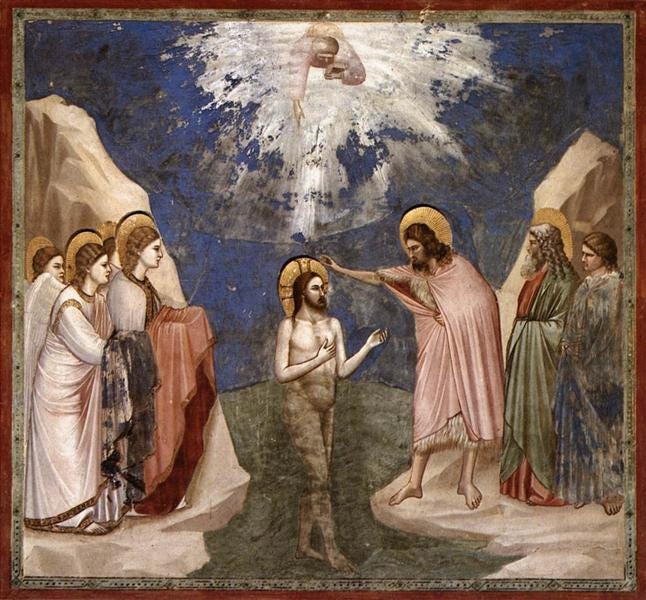
John the Thomist or John the Balthasarian? How about John the Christian?
The Baptism of the Lord
There’s a fundamental principle in the thought of St. Thomas Aquinas that states: “Action follows being.” In simpler terms, what a thing does is determined by its nature. This principle has several significant implications. Let’s focus on two key ones.
First, since action is a consequence of being, everything a thing does already exists within it as potentiality that is actualized when the thing is moved from potential to act. In other words, a thing cannot perform an action that it lacks the potential to do. For instance, my dog Floyd cannot fly because it’s not inherent in the nature of corgis to fly. However, Floyd could be trained to herd sheep because his breed has been selectively bred over centuries to perform this task. Nevertheless, a thing cannot perform an action that its nature prohibits.
Second, I can observe a thing’s actions and reason backward to gain a deeper understanding of its nature. By observing Floyd’s playful behavior with toys in the yard, I can infer that he is clearly a herding dog. Similarly, examining his short, stumpy paws allows me to deduce that he can’t get very high off the ground.
Putting these two implications together, we can say: being is a limiting factor of action; and action is a revelatory agent of being.
It’s unfair of me to delve into such philosophical musings when you’ve just returned from a long break; but both ideas are fundamental to the mystery that the Church presents to us today: baptism. For what transpired during the moment of your baptism is nothing short of a change-in-being. You emerged as an entirely new entity—the same person, yet a new kind of person. A profound transformation occurred within you, not merely on a superficial level, akin to dyeing your hair, but at the very core of your being. And my point in laying this philosophical foundation is that, on account of that change-in-being, there should be a consequent change in action; and that change-in-action should always and everywhere reveal that you are something different.
Before we talk about our baptism, let’s look at Jesus’ baptism first. On the banks of the Jordan, Jesus stands in line with sinners, awaiting John’s baptism. He is not a sinner; in fact, he is the Son of God. When the water is poured on his head, nothing within him changes. “When heaven was opened and the Holy Spirit descended upon him in bodily form like a dove,” he received nothing that he didn’t already have since his humanity was sanctified by the Spirit from his conception. The voice declaring him the Father’s beloved son with whom he is well pleased speaks only the truth that has been true from before the foundation of the world. What is remarkable about Jesus’ baptism is that nothing happens to him. His baptism was not for his own sake but to reveal the profound transformation we undergo in this sacrament of our rebirth.
Now, when we are baptized, all that we just saw happens to us: We go with Christ into the water. We receive the Holy Spirit. We are declared the beloved son or daughter of the Father. And thus, in baptism we become limbs of the Body of Christ, temples of the Holy Spirit, and members of God’s family. Make no mistake: before the water hit our head, we were none of those things. However, from that moment on and forever thereafter, we are a different thing. Becoming a Christian is nothing less than becoming a new creature. Saint Paul teaches, “If anyone is in Christ, he is a new creation; the old has passed away, behold, the new has come” (2 Cor. 5:17).
But let’s not forget that action follows being. On account of the change that has taken place in us, we must inhabit the world in a different way. We have not been made a new creation just to be the same old creation as everyone else. We know what the old creation can do, again, St. Paul: “the wages of sin is death,” but he goes on, “the gift of God is eternal life in Christ Jesus our Lord” (Rom. 6:23). The old creation leads to death, the new creation leads to life. But it falls to us to choose to live in accord with the new and not with the old.
While we’re in a philosophical mood, here’s a thought experiment. Imagine if you were to bracket out everything Christian about you—your beliefs about God, the world, and yourself, all that you know of God’s goodness and love, every hope that you have in eternal life, and every act of love you perform in Christ’s name. If you set all of that to the side, would your life appear any different from how it currently is? Sure, if you took that away, you’d probably still strive for virtue, try to make the world a better place, and treat people the best you can. But there should be something missing, shouldn’t it? Do you think Mother Teresa would have done what she did without Christ? You might say no, but you’re not Mother Teresa. And that’s the point. The saints are those people who lived with the unshakable conviction that Christ is real, that their baptism mattered, and that their life must manifest—and manifest to a radical degree—what they believe. We might not be Mother Teresa, but you and I are not second-class Christians. Every person who enters the water of baptism is destined to become a saint and, thus, every Christian is meant to live what they are.
As you come back to campus today, the Christmas season comes to an end. When we left in December, we left off with John the Baptist, and here he is again—and for good reason. The entirety of John’s life was a deliberate gesture away from himself and toward Christ. He proclaimed, “Behold, the Lamb of God!” (Jn. 1:36). He acknowledged, “One mightier than I is coming. I am not worthy to loosen the thongs of his sandals” (Lk. 3:16). When the world looked at John—at how he lived, at what he was doing—he made sure that they saw Jesus because Jesus was the foundation of his life.
John may have been a prophet, but he probably wasn’t out in the desert meditating on the philosophy of St. Thomas Aquinas. He didn’t need to. He understood that action follows being, that being is a limiting factor of action, and that action is a revelatory agent of being. He knew that he had to live on account of who he was, and he knew who he was in relation to Christ. John lived so well that we’re told the people “were asking in their hearts whether John might be the Christ.” John could be mistaken for Jesus. If we’re living the Christian life as we should, shouldn’t the world make the same mistake of us?
Given at Mount St. Mary’s University, January 12, 2025.












